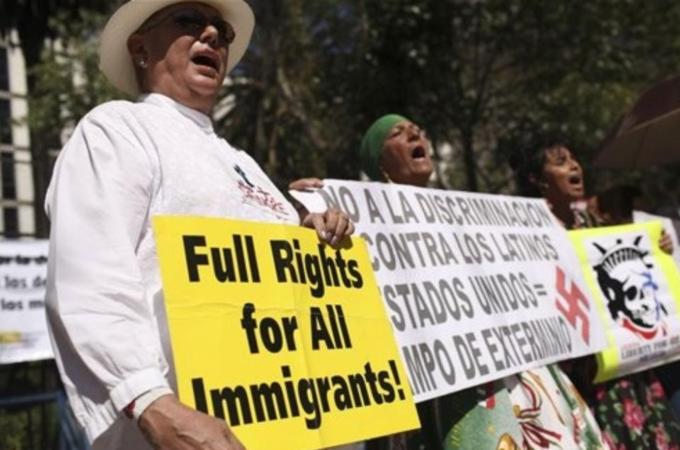Matthew Behrens
| May 21, 2013
Toronto’s legendary refugee rights lawyer Barb Jackman has a unique way of framing issues at their most human level, an art often lost by those who spend their lives in courts and immigration tribunals fighting for their clients’ right not to be deported to torture and other cruelties. Testifying recently before a Senate committee on a repressive piece of deportation legislation, Jackman aptly summed up the mean political culture that increasingly grips the land.
Bill C-43 (a.k.a., most inappropriately, the Faster Removal of Foreign Criminals Act) could be called the double punishment bill, because that’s essentially what it does: individuals without full citizenship status in Canada not only face a sentence if criminally convicted, but automatic deportation following that, without ministerial discretion to examine the context of the conviction and the severe consequences of forced removal on individuals, families and communities.
“Taking away humanitarian discretion, which we have never not had, is a fundamental change in the way we look at non-citizens,” Jackman told the Senate. “I believe there should have been a national debate about whether or not we want to go there in terms of being a mean, petty, disgusting country.”
C-43 removes from a whole class of people access to the immigration appeal division and, in a masterstroke of fundamental unfairness, also applies retroactively to permanent residents who’ve served sentences of over six months that predate the new legislation. Hence, someone who has a criminal conviction from 15 years ago may now be uprooted from their family and deported without access to any kind of appeal. Pre-C-43, if the sentence was 2 years less a day, one could appeal for discretionary relief from a deportation order. But if the sentence was 2 years or over, even by a day, that appeal disappeared. Under C-43, the benchmark is reduced to a six-month sentence, and applies retroactively to someone who, when they negotiated a sentence, thought they would have access to an appeal if facing deportation.
The issue was explored in the Supreme Court’s Pham decision earlier this year, in which an individual who seems to have been caught up in circumstances beyond his control was sentenced to two years behind bars, removing the possibility that he could appeal to the Minister to consider the context of his case and humanitarian reasons for allowing him to stay. The Supreme Court reduced his sentence by one day so that Pham could have access to a deportation appeal; C-43 removes that possibility.
Destroying lives under C-43
The Canadian Bar Association’s Gordon Maynard provided numerous examples to Senators of folks whose lives will be destroyed under the new legislation. For example, “a permanent resident in Canada since 11 years of age, here for 20 years, with parents here and siblings, married with children but suffering from alcoholism and mental illness, loses his employment, falls into substance abuse and engages in petty frauds and credit card thefts. He is convicted of his first criminal offences in Alberta; he is given a six-month sentence. By Bill C-43, there is no review of his circumstances upon issuance of a deportation order. His time in Canada, his illnesses, his family and his lack of any prior record will not be considered. There is no appeal to the appeal division.”
A Canadian citizen facing the same circumstances would only be punished once and, perhaps, be directed towards help for mental illness and addiction issues. Not so for the permanent resident or refugee. Maynard posed another possibility, whereby a “Mr. Singh, a permanent resident in Canada, is vacationing in Hawaii. While socializing in a bar, there is a racial insult, an argument and a fight. He punches someone in the nose; it is a good punch. He is arrested and appears before a judge the next day. Mr. Singh does not want to spend his time in Hawaii fighting a charge that he does not believe he is guilty of, but he pleads guilty to go home. He pleads guilty to assault causing bodily harm and pays a $200 fine. He is released and allowed to return to Canada…. It is a conviction outside of Canada for an offence in Canada that is classified as serious. It does not matter what penalty he got. Under Bill C-43, when he is issued a deportation order, there is no review in the appeal division.”
Criminal lawyers point out that the new legislation will likely cram the already overcrowded prison systems with permanent residents who are fearful that taking a conditional sentence in the community will harm their chances of staying in Canada. Indeed, conditional sentences for minor offences tend to be longer than those behind bars, but if a conditional sentence is over six months, that is a ticket to deportation; a four-month jail term may be sought instead, increasing the cost of punishment and also blocking the individual from community programs.
Who does this legislation most affect? Not ‘foreign’ criminals
While Immigration Minister Jason Kenney crows from atop his deportation perch that this legislation is necessary, those most affected are not “foreign” criminals but rather long-time residents who have made mistakes but, because of their status in Canada, face far greater consequences than those born here, with no right of appeal. They are not alone. The legislation stretches into the Twilight Zone by nailing individuals who are only suspected of having committed an offence outside of Canada — no actual proof of conviction required — with no chance to review the CBSA officer’s decision.
In a shout-out to CSIS, Canada’s scandal-ridden spy agency, C-43 also requires that individuals applying for citizenship attend a mandatory interrogation, in which they must answer all questions “for the purposes of an investigation,” a significant change from the current requirement, which limits the need of the interviewee to answer questions to those that are “reasonably required.” Canadian citizens can refuse to answer questions from CSIS; but refugees and permanent residents are losing any wiggle room, exposing them to a grilling that, should they fail to co-operate in a broad-ranging questioning that may have nothing to do with their application (a common enough practice as it is), will result in a failure to pass security screening.
In yet another example of officially legalizing what has been a standard practice of Mr. Kenney’s (such as in the high-profile case rejecting entry of British MP George Galloway), the Minister under C-43 can deny entry to Canada to anyone for a period of three years based on undefined “public policy grounds.” The Canadian Bar Association condemns this as an unprecedented Ministerial power that “invites arbitrary application and abuse. It is repugnant to the fundamental principles of Canadian democracy and the freedoms protected in the Canadian Charter of Rights and Freedoms. The lack of accountability and the vague criteria would allow Ministers who may so choose, to deny entry to persons whose views are unpopular or simply objectionable to the government of the day.”
Televising Canada’s culture of meanness
While the new law — which passed the Senate committee last week without amendment and is up for third reading later this month — will likely be the subject of litigation, another exercise of this government’s culture of meanness ran into rough waters earlier this year when a grassroots campaign was brilliantly organized to end the exploitation of some very vulnerable souls.
Readers may recall the high-profile arrest of a group of B.C. workers that was filmed by the reality TV program Border Security, a Force Four “entertainment” enterprise airing on National Geographic TV. While in detention, the arrestees had waivers placed in front of them, demanding they sign away their right to privacy so the show could air their arrests, interrogations and deportations.
Based on a highly rated Australian show that, according to unclassified memos sent to the Canadian Border services Agency (CBSA) minister, “reinforces main compliance messages,” Border Security was recommended as a good investment for the federal government, especially since the U.S. Customs and Border Protection also pursues “a robust program to engage the film and television industry.” That’s how the CBSA became a television producer.
Like the 1976 satire on news media, Network, whose corporate executives hire armed groups to film themselves while engaging in bank robberies and other headline-grabbing events in order to boost ratings, Border Security has a built-in incentive to produce dramatic events that will draw viewers. Indeed, the CBSA calls itself “de facto executive production authorities and, as such, would identify scenarios, sites and storylines, as well as provide active engagement in, as well as oversight and control of, all film shoots.”
CBSA’s history of using migrants as fodder for attention
This is not the first time CBSA has used migrants as fodder for attention. Its notorious “Wanted by the CBSA” website maligned dozens of individuals by posting their pictures and describing them as war criminals, among other disparaging terms. Follow-up to that campaign resulted in a September 11, 2012 CBSA memo from agency vice-president Pierre Sabourin, who advised that his website would “feature a minimum of 35 individuals who will be continuously refreshed and updated with cases from the CBSA immigration warrant inventory.”
Notably missing in that memo was the human element of wrongly named individuals whose privacy is obliterated, and whose safety is put in serious jeopardy if they are in fact arrested and deported with the “national security” label strapped across their CBSA mug shot. No, they are merely part of the CBSA’s collateral damage inventory, people whose lives have no meaning other than as tools for carrying out their propaganda campaign either on websites or TV programs.
Like CBC or NBC executives considering their fall lineup of comedies and police dramas, the CBSA was faced with a conundrum, concluding there just aren’t enough alleged threats out there to keep the most-wanted program continually refreshed. As a result, “a proposal for the expansion” of the program’s criteria was said to be forthcoming. Shortly afterward, CBSA decided to both expand the criteria for inclusion on the Most Wanted list while dropping the inventory from 35 to 20. The briefing note does acknowledge, in one of those bureaucratic sops to that archaic notion of presuming innocence, that including the wider net of cases on the website may “be perceived negatively by the public as these individuals have not yet been determined to be inadmissible to Canada.”
The solution to this lack of inventory likely feeds into Border Security, where CBSA control of storylines could contribute to a greater public involvement in the Most Wanted program, noting, “Communications is exploring additional avenues to generate additional public interest and exposure to the ‘Wanted by the CBSA’ program, including pro-active media releases.”
While the CBSA’s most-wanted program is facing lawsuits and privacy complaints (forcing the agency to perhaps reconsider the use of such inflammatory labels as war criminal), its biggest concession to public pressure was the response to the Deportation is Not Entertainment campaign, which rallied thousands to decry the abuse of migrants for entertainment purposes. The agency will not air footage from the original immigration enforcement raid (though numerous of the detainees have since been deported), and CBSA seems slightly humbled. But the offensive program remains on the air, and efforts to derail it continue.
Meantime, it is never too late for Canadians to ask themselves just how mean, petty, and disgusting they are prepared to let things get. There are plenty of opportunities to get involved in grassroots efforts to reverse the tide.
Matthew Behrens is a freelance writer and social justice advocate who co-ordinates the Homes not Bombs non-violent direct action network. He has worked closely with the targets of Canadian and U.S. ‘national security’ profiling for many years.
Available on Rabble
What are your thoughts on this article?
Please Share!















